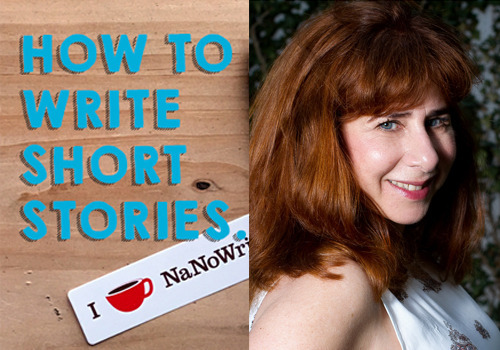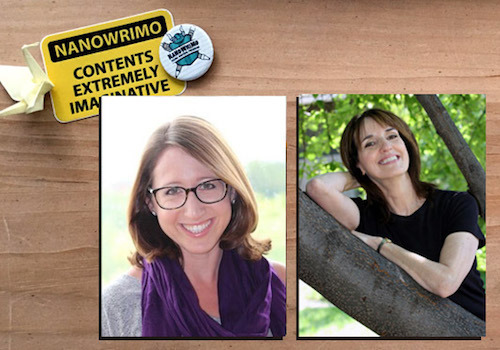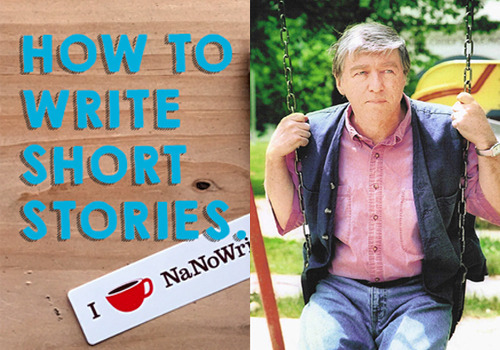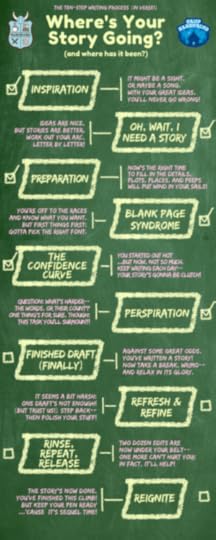Chris Baty's Blog, page 102
May 16, 2018
Author Interview: Eat Your Dessert First

We’re partnering with StoryADay for Short Story Month this May, the perfect opportunity to track a new NaNoWriMo goal, or start a new Young Writers Program personal challenge. Today, author Sarah Aronson shares her advice to questions from Julie Duffy at StoryADay:
Q: What is your one go-to piece of general advice for writers?
A: PLAY. Don’t be afraid of failure. Instead, experiment. Try everything! Or as my first editor said, “Eat dessert first.”
When I started writing The Wish List series, I called it my “peach sorbet.” It was a sort of palate cleanser, after the “real” work was done. It was a project I wrote just for myself—no expectations.
It wasn’t long before I realized that play, or writing without expectations, makes me a better writer. When I play, inspiration emerges. Intuition doesn’t feel so impossible. I enjoy myself more!
When I challenged myself to banish my internal editor, I found that I could write all kinds of stories—and that I enjoyed the process a lot more!
Q: How do I find interesting topics and stay true to myself?
A: I turn off my phone. I go for long walks. I listen to what is happening around me.
When I get inspired, I don’t rush. First I journal—with a pencil. Sometimes I draw. Sometimes, when I don’t know how to process what I’m feeling, I draw squares! I think about the universal themes that are important to me. I mine my memories for emotions and details.
And every day, I keep writing.
Remember: at first, story can be elusive. In other words, my books require re-imagination!
Characters don’t usually emerge fully formed. For me, this early writing helps me figure out what my characters want—what makes them three dimensional and interesting—and what will generate tension and conflict. So I stay patient. I dig. I write poetry. I read poetry. I think what is important to me and what I want to say.
The truth is: I never save my early drafts. Instead, I write them to discover. To uncover. To figure out what I want to say in the story.
Q: Should I share my work? When, and with whom?
A: Sharing your work is an act of bravery. But it is essential. For a few reasons.
Constructive feedback helps you figure out what you are doing well.
It also helps you see where the reader is not that vested in your story.
Handing over your story to a trusted reader also gives you some distance from the story—so you can go back in fresh.
No one writes completely alone. When you have a strong, supportive writing community, you will feel braver. You will take more chances. You will have someone to talk about craft with. You will have someone to share this journey.
Write a scene that happens before the start of your story.
It can be the first thing your character (or you) remembers. It can be an event that changed the way your character sees the world. When your done, take a step back. What does this scene say about your character and what she wants? How does this story affect the way your character sees the world?
Sarah Aronson began writing for kids and teens when someone in an exercise class dared her to try. Since then, she has earned an MFA in Writing for Children and Young Adults from Vermont College of Fine Arts, and published three novels: Head Case, Beyond Lucky, and Believe. Her most recent books are part of a new young MG series, The Wish List (Scholastic, 2017–2018) as well as a forthcoming picture book biography, Just Like Rube Goldberg (Beach Lane Books).
May 14, 2018
How to Piece Together Research and Free Writing

Even though the frenzy of April’s Camp NaNoWriMo session has passed, that doesn’t mean you need to stop writing! If you’re feeling like you want to continue your noveling adventures but you’re not quite sure where to go with them, participant Larisa Hunter shares some tips for researching and organizing your first draft:
Free writing is exactly how it sounds: you sit down and just write. It doesn’t seem like it would be a good tool to organize your thoughts, because it’s somewhat chaotic, but I find it very useful. You don’t have to write about a specific thing; you just take thoughts that are all over the place and put them down.
I’m usually a very organized person. I used to be extremely organized until I became a mom, at which point it began to be more trouble than it was worth. You can’t always predict what kids will do, and planning for everything is virtually impossible (as children, if nothing else, are great at finding the one thing you didn’t prepare for). I began to realize that not much was under my control. Life is often fraught with unexpected events, so trying to organize everything is virtually impossible. In completing a writing project, I’ve found that a mix of free writing and organization work best for me.
If you’re writing nonfiction, you have to do research. There’s no way to avoid this, as getting facts wrong can be devastating to your reputation as a writer. When writing nonfiction, you’ll also usually need many sources to research any topic.
To organize my sources, I find it easier to research one topic at a time and list notes for each section. Each note includes essential information about my source, including the author, title, year, publisher, and page numbers for direct quotes. Making my bibliography is super easy with those notes. I always make sure my sources are backed up by both internet and physical books to ensure I have correct, up-to-date information. It’s vital to ensure your sources are accurate and that you’re sticking to the rules of the style guide you’re using.
With fiction, research can be helpful if you’re looking for background information. It can help you create believable settings and characters. If you’re writing about a fire fighter, you’d want to find out as much as you can about a fire fighter’s life. Don’t be afraid to ask someone who has direct experience if they’d be willing to give you the details of what their job entails.
Think about fiction research as a way to be a kind of detective: you’re discovering material that you can use to push the story forward. You can research locations locations by physically going to them and noting what you see, and you can read stories similar to the one you want to write.
Step Two: Free WritingAfter I compile my research (or at least have an idea of what exactly I’m going to write), I then go into my free writing sessions. I personally prefer to just sit down at my keyboard and start typing. I don’t really have an idea of where I’m going in the beginning, but I often find the idea when writing it down. Sometimes just putting your fingers on the keys and allowing your mind to pour out its ideas becomes a very good way to finish your project—or at least begin to work it out.
Don’t worry at all about structure with free writing. Don’t worry about grammar, spelling, or anything related to editing and formal writing. Free writing is an exercise to get your inspiration going. I find it extremely helpful to just roll with it, to allow yourself to go places in your mind and to write your story in whatever way you want.
It’s helpful to set a time limit on the free writing block—say, twenty minutes—then sit and self-reflect. Review what you’ve written and take a critical eye to it. This may require you to give it to someone else because we often can’t criticize our own work fairly—we tend to be way too harsh on ourselves, or self-deprecating of our own talent.
Writing is an art, and art takes time to craft. You have to have a lot of patience with yourself. Sometimes pressure can override your ability to have a clean piece of writing that will turn into the product that you want it to be. I think that patience is the hardest part of writing to learn, because writers often get caught up in our own heads. When this happens, take a break. Breathe, relax, go outside, do something else to get a break from yourself. These things will help organize your project in a way that is not overwhelming or stressful.
Writing should never be a chore or a task, but an expression of ourselves on the page. Remember that this is your time, your space, your page, fill how you choose. Don’t let yourself feel that this page is your enemy, but a friend waiting to hear your secrets.

Larisa Hunter has spent most of her life on the East Coast of Canada. She is the owner of a small publishing house called Saga Press, and has been involved in publishing for about 6 years.
Top image licensed under Creative Commons from Rick Payette on Flickr.
May 11, 2018
Author Interviews: Finding your Unique Story Perspective

We’re partnering with StoryADay for Short Story Month this May, the perfect opportunity to track a new NaNoWriMo goal, or start a new Young Writers Program personal challenge. Today, authors Abby R. Cooper and Martine Leavitt share their advice—and a couple of writing dares:
Q: What if I feel I don’t have anything important to say?
A: Here’s the thing. Even if you’re writing about a rock, you are the only person who can write about that rock from your point of view, with your unique thoughts and feelings and descriptions and ideas. No one else in this world can write about that rock exactly like you.
You’re probably wondering, well, who cares what I think about a rock? It’s not about the actual rock—it’s about you.
Your voice is special. It’s one-of-a-kind. It matters.
(Related: some of the best stories I’ve ever read aren’t about anything we typically consider important. Doesn’t matter. If it’s interesting to you, and you write it in your voice, it is important. And awesome. Really, really awesome.)
Writing Dare from Abby R. CooperLook around wherever you are right now and ask yourself “What if?” What if the chair you’re sitting in made you invisible? What if the raindrops tapping your window were giving you a secret message? What if your closet was a portal to another world? Write a story where you answer one of your “What if?” questions.
Read the full interview here.
Abby Cooper lives in Minnesota with her miniature poodle, Louis, and a whole bunch of books. A former teacher and school librarian, her favorite things in the world (besides writing) are getting and giving book recommendations and sharing her love of reading with others. In her spare time, she likes eating cupcakes, running along the Mississippi River, and watching a lot of bad reality TV. (Photo credit: David Cooper)
Q: What is your one go-to piece of general advice for young writers?
A: Don’t let anyone tell you there’s only one way to be a writer, or one way to write a story, or one way to do anything at all. Rules shmules—creativity is all about breaking the rules!
Someone once told me to “Write about what you know.” Problem was, I didn’t know anything. But I discovered that by researching and using my imagination and practicing radical empathy, I could write about things I didn’t know.
Another teacher taught me that “Said is dead.” In other words, writers should use other ways to express “said" in dialogue, like “‘I’m going to the store,’ she exclaimed.” That sort of thing. WRONG. Use “said” as much as you possibly can—it’s invisible.
My point is, be highly suspicious if anyone tells you that writing has to be done in a certain way.
Writing Dare from Martine LeavittYou character finds out they can go back in time and change one thing about their life. What would it be? Tell me the story.
Read the full interview here.
Martine Leavitt has published ten novels for young adults, most recently Calvin, which won the Governor General’s Award of Canada. My Book of Life by Angel was a finalist for the Los Angeles Times Book Prize and winner of the Canadian Library Association Young Adult Book of the Year. Currently she teaches creative writing at Vermont College of Fine Arts, a short-residency MFA program. She lives in High River, Alberta.
May 9, 2018
Camp NaNoWriMo 2018: Participant Survey
Hey, writers! If you participated in Camp NaNoWriMo this April, please click on the link above and take a few minutes to fill out our survey. Camp NaNoWriMo is in for some big changes next year—and we want to hear from you. This survey helps us get to know who you are so we can better serve you all. It also helps us see which parts of Camp NaNoWriMo are successful, and which parts could use some work. Your thoughts are always appreciated!
May 7, 2018
Conquering Writer's Block: Online Generators Edition

Even though the frenzy of April’s Camp NaNoWriMo session has passed, that doesn’t mean you need to stop writing! If you’re feeling like you want to continue your noveling adventures but you’re not quite sure where to go with them, participant Kayla Ann Diaz shares some tips for beating writer’s block:
If you’re like me, there is always a point in your writing in which the dreaded phenomenon known as writer’s block occurs. Some people say that writer’s block isn’t real; it’s just insecurity or the anticipation of an epiphany that causes writer’s block.
In my case, every experience I’ve had with writer’s block resulted from one of two reasons: I either got bored with the idea I initially had, or I ran out of ways to embellish that idea.
I’ve found that I can get myself writing again in one of three ways:
Introducing a new characterMoving my characters to a new placeUsing a random prompt to spark inspirationOnline generators help in all three areas. Online generators are inherently prompt generators, a great tool to have for a project like NaNoWriMo. I use them for inspiration and as a way to add a new element to my story more quickly. What better use for something like that than a writing project in which you need to crank out as much content as possible in a short amount of time?
In the corner of the Internet, I found little nuggets of content gold.
Of the three methods I previously mention for adding words to the page, my favorite is character creation. New characters thrown into the mix have unique backstories and motives, which can take on a life of their own. They are an excellent source of new material. There are online generators out there that make adding characters to your story simple by either supplying a unique name or giving you a character description to embellish.
For some writers, even just a new name for a character can spark creativity and battle writer’s block. For one story, I received the name “Inissa" from a name generator. It made me think princess, royalty, a heart of gold. I immediately saw long dark hair, blue eyes, and a scar on her arm from that time she went to the market in disguise and saved a homeless boy with ailurophobia from a stray cat.
Perhaps a simple, generic character description will do the trick. You could create a few humorous moments in your fantasy epic by introducing “The unathletic Druid” or have the sudden misfortune of adding “The awkward, pious, clinging Rogue” to your party. Your stalled science fiction masterpiece may even be in need of “The bitter, philandering cyborg.” The descriptions are just generic enough to get ideas flowing. You start contemplating situations before even officially adding them to the story.
There are even generators that provide detailed character descriptions for more severe writer’s block, randomizing and selecting things like demeanor, gender, and physical descriptions.
Don’t like a name or character description you received? With the click of a button, you receive a whole new word or phrase to use. You can keep refreshing until you find something you like, something that sparks creativity for you.
The following are online generators I use. I hope they help you the way they help me. Happy writing!
Seventh Sanctum — the first online generator I ever used. The generators here span different categories that range from generic to descriptive.Chaotic Shiny — my new obsession. It has writing and gaming generators, a lot of them designed for D&D campaigns. I whole-heartedly recommend the Tavern/Inn generator.
Kayla Ann Diaz grew up in Brooklyn, New York and is still adjusting to life in rural Pennsylvania. She has loved writing ever since she discovered forum roleplaying, and she has participated in NaNoWriMo events since 2010. She finds inspiration in works like Terry Goodkind’s The Sword of Truth series while secretly favoring the young adult Percy Jackson series by Rick Riordan. Kayla has a B.A. in English and has a passion for fantasy and all its subgenres.
Top image licensed under Creative Commons from Judit Klein on Flickr.
May 4, 2018
Author Interview: Jerry Spinelli on How to Start a Story

We’re partnering with StoryADay for Short Story Month this May, the perfect opportunity to track a new NaNoWriMo goal, or start a new Young Writers Program personal challenge. Today, Newbery Honor author Jerry Spinelli shares advice to questions from Julie Duffy at StoryADay:
Q: How do I decide what to write about?
A: Ask yourself “What do I care about?” In fact, make a list of five or ten things. There’s your start.
Q: But all I know is my family and my town. All I do is go to school and hang out with my friends and play a sport. Is that enough to write stories about? Don’t I have to have had real adventures?
A: That’s all you need to know. Every human life is an adventure. That person sitting across from you is a walking, breathing story, even if he or she doesn’t know it. Your job starts long before hitting the keyboard. At this point your job description has only two words: Pay attention. Get out of yourself and into everybody and everything else. Find a place at night where light pollution is minimal. Look up… look up, dissolve yourself into the universe and wonder. Every good writer is a terrific wonderer.
Q: What if I don’t really know how to go about writing a story?
A: Start by writing story elements. Just a few lines, a half-page. A dialog between two kids arguing here, a description of an abandoned dog there. Stories are patchwork quilts you stitch together with words. And this: read. Read. Read. Read.
Q: How can I made readers care about my story and my characters?
A: By caring about them yourself. Pour that caring, that paying attention, into your story and they will care.
Play a game one day. Call it Seed Day. Spend the day paying attention. Try to see, try to feel a little deeper than everyone else seems to be doing. At the end of the day identify at least one thing that you suspect was noticed by nobody but you. That’s your story seed. Now one more thing. Ask yourself: Does this touch my heart? If it does, that’s the water. OK, you’re ready… write!
Jerry Spinelli is a Newbery Award honored author. Spinelli’s hilarious books entertain both children and young adults. Readers see his life in his autobiography “Knots in My Yo-Yo String”, as well as in his fiction. Crash came out of his desire to include the beloved Penn Relays of his home state of Pennsylvania in a book, while Maniac Magee is set in a fictional town based on his own hometown, Norristown, PA.
Julie Duffy is a writer and the host of StoryADay.org – a creative writing challenge that happens each May (and yes, you’re invited). She writes articles and courses to help other writers get their creative groove on, and speaks to writers’ groups and conferences about creativity, short story writing, self- and e-publishing, and social media.
May 2, 2018
“In My End is My Beginning”: the Post-Camp Novel Effort

Now that the frenzy of Camp NaNoWriMo has passed, it’s time to figure out what’s next! That could be anything from taking a break from your manuscript to diving right into edits or revisions. Today, participant Susan Tait shares her plan for post-Camp noveling:
I feel stunned. In the afterglow of “I really did write 52,000 words in a month!” the post-Camp effort of organizing my writing feels like trying to unload hastily-packed boxes after moving to a new house. There’s all this stuff that got crammed in during the fury to finish.
Advice was never-ending and contradictory, so I stopped reading it. It mostly amounted to this:
“Don’t edit while you write! Just get it out!”
“Edit while you write, or you’ll just have a big mess at the end.”
I think they’re both right. The novel’s gotten “out,” but what’s gotten out has more obvious problems than strengths: outline fragments, broken dialogue, zeroes filled in for o’s the week I switched keyboards (how did I forget to review my spelling and grammar more often?), a fantastic idea I remember having but can’t find, paragraphs that “seemed like a good idea at the time.” Acknowledgement for source quotes and research notes is so far behind that it feels like another book. Plus the dawning realization that some of my cardboard characters spitefully defied their assigned roles and did what they wanted to.
Now, in the aftermath, I could:
Put the whole binder in the drawer as evidence of effort, and write a short story that I resist titling, “And Now For Something Completely Different.”Wax philosophical about what I learned, writing a personal development essay that will make it clear to me what I know now that I didn’t then.Rewrite, revise, review. I can do the other two things any time. Perhaps a character with the worst character arc needs a short story to clear things up. Maybe a decision diagram on tracing paper superimposed on a generously sized timeline would show me where things went wrong—or if I’ve actually written some alternative history.To my surprise, I like what I have enough to pursue polishing the messy draft that I started last month. To pick the advice that’s going to work for me, I need only remember one thing:
Maintain my engagement with my characters while re-engaging with my readers.Some of my characters are based on real people, others completely invented. They all have a real relationship with me, something like the relationship of befriending people online that you never meet in real life. My characters make me look at how I engage with people and what I project onto them.
It doesn’t matter in what order I fix all the problems with my draft. What matters is that I start a process that will create a community larger than the sum of my novel’s parts: that place where characters and readers meet. The only way to build that is to start where I am, regarding my dirty draft as clean compost.
I adopted my writing motto (and the title of this post) from Mary, Queen of Scots: the end of the dirty draft is the beginning of a new chapter.
Recommended Links:
Looking at a fresh start for content that will integrate easily? Try L.E. DeLano’s suggestion in her recent Swoon post on why you should know what changed for you and your character last month.I don’t write what I know; I write to find out what I don’t. Sounds like you? This Atlantic column on the value of fiction shores up exploratory writers.
This FAQ with award-winning novelist John Scalzi goes much wider than science fiction—terse, kind, and some of the comments are also pretty funny and helpful.

Susan’s first novel collapsed into a short story that she round-filed. It taught her enough to succeed at her second novel, which she wrote during NaNoWriMo 2017, and finished during the Now What? Months in February 2018. Fountain pen fiend, amateur painter, past winner of two Writer’s Digest competitions, and a certified scrum master, she lives in Oregon with her husband, son, and three cats. See more about her on LinkedIn.
Top image licensed under Creative Commons from Sandy/Chuck Harris on Flickr.
April 30, 2018
"If you’re stuck, think about the last story you loved. It doesn’t have to be a novel; it could be a..."
-

Amy Spalding grew up in St. Louis, but now lives in the better weather of Los Angeles. By day, she manages the digital media team for an indie film advertising agency. By later day and night, Amy writes, performs, and pets as many cats as she can. She is the author of five young adult novels, including her latest, The Summer of Jordi Perez (and the Best Burger in Los Angeles). (Author photo: Robyn Von Swank)
Your Camp Care Package is brought to you by Camp NaNoWriMo. Sign up to receive more Camp Care Packages at campnanowrimo.org.
April 27, 2018
Camp Pep: Breaking All the Rules!

Camp NaNoWriMo is nothing without you, our incredible participants. The final week of April is upon us (already!) so today, writer Ellen Rozek shares a welcome reminder that rules are made to be broken:
There are almost as many rules for how to be a “real” writer as there are rules for how to write. Whether you’ve already finished a dozen different novels or this April was your first serious attempt at novel-writing, I’m guessing you’ve heard at least a few of them.
Maybe you were told that “real" writers write every day, or that they make detailed outlines before they put a single word on the page. Maybe you’ve heard that they write only the scenes that are most interesting to them before they go back and connect the dots.
When you’re stuck on your story and questioning yourself every step of the way, rules like these can act as your road map. They can show you a way forward or offer an alternate route, or get you going again when you’re one more wrong turn away from giving up. But, if you’re not paying attention, they can all too easily become a roadblock by convincing you that there’s no other right way to write your story or by tricking you into thinking that your writing process is wrong.
Spoiler alert, campers: Your writing process is not wrong.
What works for another writer may be of no use to you personally. What helps one writer finish their first novel or land their first book deal or self-publish their first book is sure to be different than whatever helps you achieve your own goals. It’s all well and good to test drive the tried-and-true rules that other writers use, but the key to contentment with your writing lies in figuring out which rules work for you and which rules you can discard.
For most of us, that’s an intimidating prospect. If you’ve been using the same writing strategies for a long time, it can be tempting to stay on the same well-traveled path even if you suspect that those strategies aren’t working as well as they could be. And if you haven’t been writing as long and aren’t sure what kinds of strategies you need, it can be even harder to choose the right ones for you.
One of the best things about writing challenges like Camp NaNo is that the tight deadlines force you to put words on the page by whatever means necessary. When you’re ten thousand words behind and you only have four days left to win, you start taking risks you might not otherwise take. You start shaking things up just to see what might work. You break your own rules—the ones that you’ve always felt required to follow—without batting an eye.
“Experimentation often leads to new discoveries, which is why it’s so important to make experimentation a part of your writing life.”Maybe you’ve always thought of yourself as an evening writer—the sort of person who sits down at their computer once they’ve come home from work or school and had dinner. But because you’re behind, you start getting up early to write in the mornings and find that you’re twice as productive before you’ve technically started your day. Maybe you’ve always been a pantser, but you realize that you’re going to have to make some kind of outline in order to get to ‘the end’ in time. Maybe you decide to toss your outline out the window and discover that it’s far more freeing to write whatever comes into your head instead.
Experimentation often leads to new discoveries, which is why it’s so important to make experimentation a part of your writing life even when you’re not desperately behind on your deadlines or racing toward a word count goal that feels insurmountable. Forging your own path, determining how you create, and developing the best practices for the writer you are, instead of the writer you think you should be, is as much a process as the writing itself. If you’re not satisfied with the way your writing is going or the way you feel about your story, I encourage you to try something new.
After all, the only rules that matter are the ones that make you feel good about the story you’ve set out to tell. The rest are made to be broken.

Ellen Rozek is an administrative assistant by day and a writer the rest of the time. She writes young adult and new adult fiction almost exclusively, but she’ll read just about anything. When she’s not immersed in stories and storytelling, she’s either doing yoga, experimenting with recipes, or planning her next big vacation. You can check out her blog at ellenmrozek.wordpress.com or follow her on Twitter @EllenRozek.
April 26, 2018
Where’s your story going?Need a checklist to visualize the steps...

Where’s your story going?
Need a checklist to visualize the steps you’ve taken with your story (and the steps that still need to be completed)? Check out this handy guide to our 10-step writing process… written in verse for National Poetry Month!
And don’t forget to update your Camp NaNoWriMo projects! If you’ve already reached your project goal, make sure to validate your win on campnanowrimo.org before April 30th.
Follow @nanowrimo and @nanowordsprints on Twitter for more inspiration, or share your winning pictures with us on Instagram using the hashtag #CampNaNoWinner2018!
Chris Baty's Blog
- Chris Baty's profile
- 63 followers



